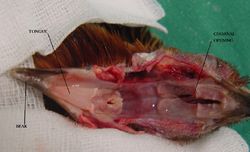Difference between revisions of "Avian Tongue - Anatomy & Physiology"
Jump to navigation
Jump to search
| (7 intermediate revisions by 3 users not shown) | |||
| Line 1: | Line 1: | ||
| − | |||
==Overview== | ==Overview== | ||
| Line 8: | Line 7: | ||
==Structure and Function== | ==Structure and Function== | ||
| − | The avian tongue is narrow, pointed and contains little intrinsic muscle. The '''enteroglossal bone''' is present consisting of bone and cartilage with medullary spaces containing red marrow. It is supported by the lingual process of the '''[[Hyoid Apparatus - Anatomy & Physiology|hyoid bone]]''' and rudimentary lingual muscles. It contains striated | + | The avian tongue is narrow, pointed and contains little intrinsic muscle. The '''enteroglossal bone''' is present consisting of bone and cartilage with medullary spaces containing red marrow. It is supported by the lingual process of the '''[[Hyoid Apparatus - Anatomy & Physiology|hyoid bone]]''' and rudimentary lingual muscles. It contains striated muslce fibres. |
| − | == | + | ==Species Differences== |
| − | + | '''Parrots''' use their muscular tongue to lap water and to produce human sounds (see [[Syrinx - Anatomy & Physiology#Species Differences|here]]). | |
| + | <br /> | ||
| + | <br /> | ||
| − | |||
| − | ''' | + | ==Links== |
| + | |||
| + | '''Test yourself with the [[The Avian Alimentary Tract - Anatomy & Physiology - Flashcards|Avian Alimentary Tract Flashcards]]'''. | ||
| − | + | '''Click here for [[Avian Tongue - Histology|avian tongue histology]]'''. | |
'''Click here for [[Tongue - Anatomy & Physiology|tongue - Anatomy & Physiology]]'''. | '''Click here for [[Tongue - Anatomy & Physiology|tongue - Anatomy & Physiology]]'''. | ||
| − | |||
| − | |||
| − | |||
| − | |||
[[Category:Avian Alimentary System - Anatomy & Physiology]] | [[Category:Avian Alimentary System - Anatomy & Physiology]] | ||
| − | [[Category: | + | [[Category:To Do - AimeeHicks]] |
Revision as of 08:42, 10 September 2010
Overview
The size and structure of the avian tongue varies between species. It is related to functional requirements.
Structure and Function
The avian tongue is narrow, pointed and contains little intrinsic muscle. The enteroglossal bone is present consisting of bone and cartilage with medullary spaces containing red marrow. It is supported by the lingual process of the hyoid bone and rudimentary lingual muscles. It contains striated muslce fibres.
Species Differences
Parrots use their muscular tongue to lap water and to produce human sounds (see here).
Links
Test yourself with the Avian Alimentary Tract Flashcards.
Click here for avian tongue histology.
Click here for tongue - Anatomy & Physiology.
